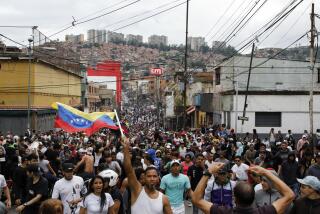Ex-Communist Declared Victor in Disputed Tajik Race : Central Asia: Opponent says results falsified. Vote does nothing to advance talks with exiled guerrillas.
- Share via
DUSHANBE, Tajikistan — Emamali Rakhmonov, who came to power by force two years ago in one of the former Soviet Union’s bloodiest civil wars, was declared the winner Monday of a controversial presidential election in this Central Asian republic.
An electoral commission picked by Rakhmonov’s government gave the 42-year-old former Communist 60% of the vote in Sunday’s two-man race. His former prime minister, Abdulmalik Abdulajanov, was given 35% and charged that the result had been falsified.
The contest between two former allies on the winning side of the war did nothing to advance peace negotiations between the government and a still-outlawed coalition of exiled Islamists and democrats, whose guerrillas have kept up sporadic, crippling attacks from bases in Afghanistan.
It came a day after the guerrillas failed to show up at a border town with 27 captured government soldiers for a scheduled prisoner exchange, prompting the government to take an equal number of opposition activists back to jail in Dushanbe.
But Rakhmonov and the exiled coalition, which opposed holding the elections, called for continuing the peace talks and a temporary cease-fire that has been in force since Oct. 20. “There is no alternative,” Rakhmonov said after casting his ballot.
The fighting, which erupted after the Soviet Union collapsed in 1991, is a power struggle among ethnic Tajiks divided into regional factions by mountainous geography. At its peak the fighting turned a tenth of the country’s 5.2 million people into refugees; it has killed more than 20,000.
In late 1992, Communist warriors of Rakhmonov’s southern rural Kulyabi faction, backed by the Russian army, drove the Islamic-democratic coalition from power, along with its fighters from the Garm and Pamir mountain regions. At first the well-armed Kulyabis shared the government with Abdulajanov and figures from his northern, industrial Khodjent region, then muscled them aside.
Some officials in Russia, whose 25,000 troops defend the Tajik-Afghan border from rebel attacks, appeared to favor Abdulajanov. The wealthy 45-year-old businessman, who is ambassador to Moscow, was viewed as more of a peacemaker than Rakhmonov, whose regime stands accused by international human rights groups of murdering opposition leaders and journalists.
But in the final month of the campaign, the Russian government delivered 15 billion rubles, or about $5 million, to help Rakhmonov’s bankrupt government pay long-delayed wages, undermining his opponent’s strongest campaign issue.
Four bombs exploded at government buildings here Friday in an apparent attempt to intimidate voters, but election officials reported a 95% turnout. People ate free servings of plov , a traditional rice dish, at the polls.
Voters gave 90% approval to a new constitution creating the presidency, with power to appoint and dismiss government ministers and judges. Rakhmonov had been chairman of Parliament, the most powerful post under the old constitution.
Official observers from Russia, four other former Soviet republics and Turkey told reporters Monday, after visiting 120 of the 2,469 polling stations, that they had detected no irregularities in the voting.
But journalists and Western diplomats here noted that Rakhmonov’s campaign had dominated state television and was openly supported by the armed security forces, who tacked up his campaign posters and often spoke in his favor.
One diplomat said that armed men visited a camp for returning war refugees and threatened to kill anyone who voted against Rakhmonov.
“All government machinery was mobilized in favor of one candidate,” said Friederike Adlung, who represents the Conference on Security and Cooperation in Europe here. That group and the United Nations declined to send observers because of the ban on most opposition parties.
Rakhmonov, who campaigned as the man who brought peace, said the election outcome had turned “a new page for Tajikistan” by showing it to be “really democratic.”
“People in Tajikistan still have a totalitarian psychology,” countered Otakhon Latifi, a spokesman for the exiled opposition. “They vote for whomever they are told to vote.”
*
Abdulajanov asserted that some ballots were distributed without his name on them and that his partisans were beaten up at one polling station. He accused the government of falsifying returns from districts where his supporters, bowing to threats, did not show up as observers.
“Rakhmonov simply took advantage of the fact that we have no armed units at our beck and call and decided to win by force,” said Babajan Ikramov, a spokesman for the runner-up.
More to Read
Sign up for Essential California
The most important California stories and recommendations in your inbox every morning.
You may occasionally receive promotional content from the Los Angeles Times.













